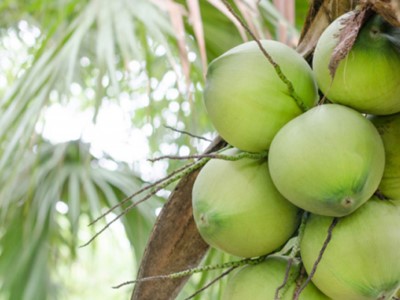Training and development of coconut for agro-processors
13 March 2023
The Suriname Standards Bureau (SSB) was established by the Act of February 22, 2006 (Suriname Standards Bureau Act S.B. 2006 no. 30) and has the statutory mandate (Standards Act, S.B. 2004 no. 121, as amended by S.B. 2012 no. 42.) to establish rules regarding standards for goods and services. Also, the Bureau is the standards authority that helps promote and to some extent monitors the quality infrastructure in Suriname. In addition, the SSB is the local representative of the Caricom Regional Organization for Standards and Quality (CROSQ) and the International Organization for Standardization (ISO).
Guaranteeing safe products to the Surinamese consumer is one of the aspects that the SSB addresses. To realize this, we have partnered with the International Trade Center (ITC) for the project "Alliances for the Coconut Industry Development Expansion and Enhanced Support for the Caribbean (Coconuts II)" in order to guarantee the quality of coconut oil and water.
The "Alliances for Coconut Industry Development Expansion and Enhanced Support for the Caribbean" project is a European Union (EU) funded project and supported by the 11th European Development Fund (EDF), in accordance with the Caribbean Regional Indicative Program (CRIP), which is under the auspices of the CARIFORUM Secretariat. The Kokos project is being implemented by International Trade Centre (ITC), CARDI and key national partners, following the Alliances for Action (A4A) approach. This is a participatory, multi-stakeholder approach to the sustainable development of the agricultural sector. The main goal is to improve the competitiveness of smallholder farmers in the coconut value chain through improved local, regional and global market integration and production. The project is being implemented in 12 CARIFORUM member countries. The beneficiaries are small coconut farmers, plantation operators, owners and workers, communities producing and processing coconut, youth and women in coconut processing and marketing, and small and medium enterprises involved in producing coconut products.
Under the MoU between the Suriname Standards Bureau and the International Trade Center, several actions will be implemented, including:
1. Testing the products of coconut agro-processors:
This will involve testing by both local and regional laboratories to indicate the quality of the coconut oil and water products. This activity has already started and the products are being tested in accordance with the guidelines.
2. Conducting field visits to the coconut agro-processors:
In order to form a better picture and get an indication of the conditions and quality under which the processes of coconut products are currently taking place, field visits were made to the coconut agro-processors in the different districts. Following the training, this group of Coconut Processors will receive guidance to improve the hygiene and production of their products.
3. Providing training:
If a producer wants to market a product, the product must meet certain specific quality requirements. The same goes for coconut oil and coconut water. The products must be safe and have nutritional value for consumers. Coconut agro-processors will be trained in the following National Standards:
1) Coconut Oil - Specifications.
2) Packaged natural coconut water - Code of Practice
3) Packaged natural coconut water - Specifications
4) Requirements for good management practices for micro, small and medium enterprises.
5) SSB-HACCP requirements
6) ISO 22000 "Food Safety Management Systems".
7) ISO 9001 "Quality Management Systems"
8) General requirements for labeling of pre-packaged goods.
Training sessions will be customized based on the test results and field visits. They are also designed to raise awareness and train coconut agro-processors in the national standards (which are in line with CARICOM Regional Standards and ISO International Standards) for coconut oil, coconut water, food safety, quality management systems and Labeling of pre-packaged goods.
The training was developed by the SSB in collaboration with the consultant from Polyformis & Principalis Consultancy and the ITC and consist of two modules of two days each.
Furthermore, the coconut agro-processors will be guided individually to implement their processes as indicated in the training and in accordance with the established standards.
4. Label Check:
Assessment and guidance of coconut agro-processors with their product labels in accordance with the Technical Regulation " General Regulations for the Labeling of Prepackaged Goods.
5. Barcode Service:
A barcode (internationally recognized) will be assigned to Agro processors for their label.
The total cooperation under this project will run from July 2022 through July 2023 in the following districts: Paramaribo, Wanica, Saramacca, Coronie and Commewijne. The training sessions will be held in 2 locations, namely: Paramaribo and Coronie.
It is important to the SSB that food-safe products are offered on the market. Furthermore, the SSB strives to provide coconut agro-processors with the necessary knowledge and tools to market their products in accordance with established guidelines (standards). Standards ensure that we use sustainable cultivation methods and techniques to achieve the highest possible efficiency within our agricultural production while preserving our nature and environment. Standards also ensure that we have safe food and improve our competitiveness with foreign countries. This can result in export opportunities that can be opened up.
The potential for Suriname to grow into a Coconut Industry is already present. We can think of suitable soil conditions and coconut palms that can be employed. With proper guidance and the application of guidelines (standards) in the processes, the coconut sector can grow into a Coconut industry.

